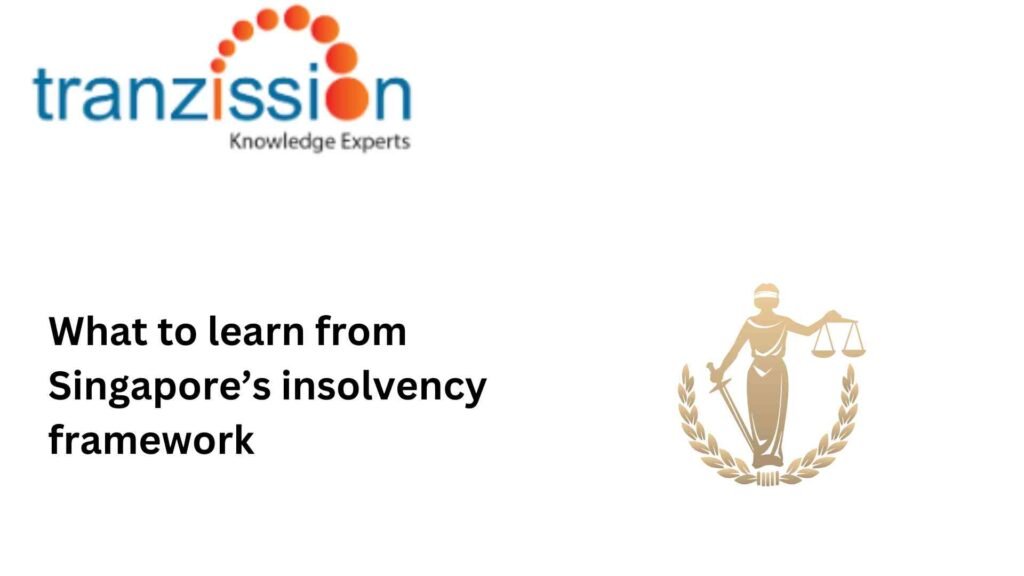Singapore insolvency framework is considered one of the best due to its efficient processes, well-designed mechanisms, amongst other features. Having an effective insolvency framework for debtors can promote entrepreneurship, and responsibility for risk-taking, and prevent distressed companies from closing down. On the other hand, a framework for creditors can help them to recover their debts if debtors become insolvent. Therefore, insolvency law should encourage lenders to extend credit, facilitating firms’ access to financial and promoting economic growth.
Key Features of Singapore Insolvency Framework
Certain features in Singapore insolvency framework make it attractive, such as:
Consolidated Insolvency Framework:
The Omnibus Insolvency, Restructuring, and Dissolution Act in Singapore refers to the Insolvency, Restructuring, and Dissolution Act, 2018 (IRDA) consolidates all personal and corporate insolvency and debt restructuring laws into a single piece of legislation. It aims to modernise Singapore insolvency framework regime make it more attractive for international restructuring cases and enhance the debtor’in-possession model for restructuring.
Read more : Doctrine of Commercial Wisdom of CoC
Adoption of UNCITRAL Model Law:
The IRDA aligns with the international standard by adopting the UNCITRAL Model Law on Cross-Border Insolvency as it effectively allows for recognition and cooperation with foreign insolvency proceedings. This makes it a preferred jurisdiction for cross-border insolvency cases and positions itself as a global hub for international insolvency matters.
The Role of the SICC:
The Singapore International Commercial Court (SICC) was established in 2015 as a trusted forum to meet the growing demand for effective transnational dispute resolution through litigation. Its specialised expertise in international commercial law, a panel of international judges, the ability to apply foreign laws, flexible procedures, and a strong reputation for efficiency make the SICC important in resolving cross-border insolvency matters.
Recent Developments in 2023
Cryptocurrency and Insolvency:
The recent focus on cryptocurrency-related insolvency cases ensures transparency and accountability in this emerging sector. They addressed key issues in cryptocurrency insolvency cases, including the classification of crypto assets and jurisdictional challenges. In B2C2 Ltd. v. Quoine Pte Ltd. [2019] SGHC(I) 3, the SICC resolved disputes on crypto asset recovery in insolvency proceedings.In this case, the primary relief sought was specific performance, and re-execution of the trades at prevailing rates. This was objected by Quoine which would have led B2C2 to an even more advantageous position, given the further fluctuations in the market. The court agreed considering the volatilities of the market, and found that the proper relief lay in the damages.
Enhanced Pre-Pack Frameworks:
The enhanced pre-pack framework within IRDA was introduced through amendments to the Companies Act in 2017. Incorporating pre-pack schemes of arrangement as a viable restructuring tool within the existing framework allowed companies to utilise a faster and more efficient debt restructuring process. It has reduced time and costs for companies facing financial distress.
Focus on ESG in Restructuring
IRDA increasingly incorporates Environmental, Social and Governance (ESG) considerations into restructuring processes. This includes evaluating a company’s environmental impact, social practices, and governance structures during restructuring proceedings. Companies are, hence, encouraged to prioritise sustainable practices as part of their recovery plans. The IRDA also encourages engagement with a wider range of stakeholders, including environmental groups and social impact investors, during this process and ensures diverse perspectives on ESG issues are considered.
Challenges and Solutions in Singapore Insolvency System
The IRDA includes many factors of insolvency law that address certain gaps in other countries, including India. But there are challenges in this framework as well, namely:
Balancing Creditor and Debtor Interests:
There are issues in striking a balance between a debtor company to restructure its debts and potentially recover financially facilitating corporate rehabilitation. The challenge of ensuring creditors receive fair treatment and are not unduly disadvantaged by the restructuring process, particularly during cross-border matters can be solved with enhanced debtor’in-possession and creditor engagement mechanisms.
Addressing Crypto Volatility:
Although there have been judicial precedents on crypto volatility, there are still many legislative obstacles regarding crypto cases. For instance, the valuation and classification of volatile cryptocurrency assets. This can be addressed by the SICC’s jurisdiction over crypto-related cases which can ensure clarity and consistency.
Cross-Border Cooperation:
The IRDA does include provisions on cross-border insolvency, but there are still many jurisdiction conflicts in multinational insolvency cases because of its complexities. Adopting the UNCITRAL Model Law the process for cross-border matters can streamline the process and provide a more standardised framework for recognising foreign insolvency.
Lessons for Global Insolvency Professionals
Importance of a Unified Legal Framework:
Unlike other jurisdictions, the IRDA brings all insolvency-related matters under one act. This streamlines procedures and provides clarity for debtors, creditors, and practice for legal professionals. Hence, Singapore IRDA serves as a model for other countries seeking to consolidate insolvency laws.
Embracing Technology in Insolvency:
IRDA also embraces technology in insolvency proceedings. Singapore proactive approach to cryptocurrency regulation highlights the need for insolvency laws to adapt to technological advancements.
Attracting Global Restructuring Cases:
Singapore insolvency has a highly regarded judiciary with expertise in insolvency matters, which further enhances the attractiveness of its insolvency regime. With the inclusion of streamlined processes and a transparent legal environment, Singapore insolvency framework has positioned itself as a restructuring hub.
